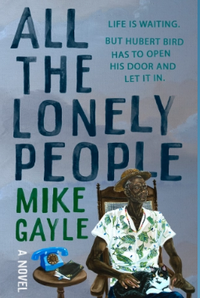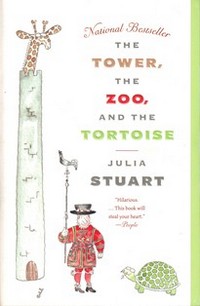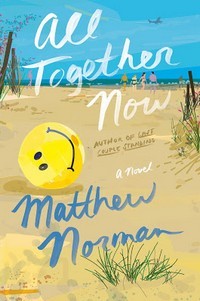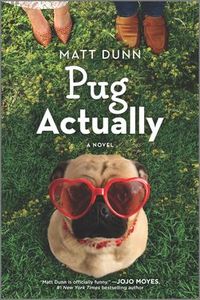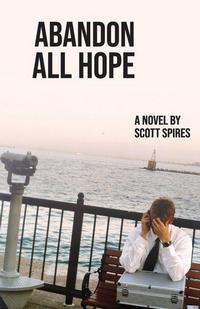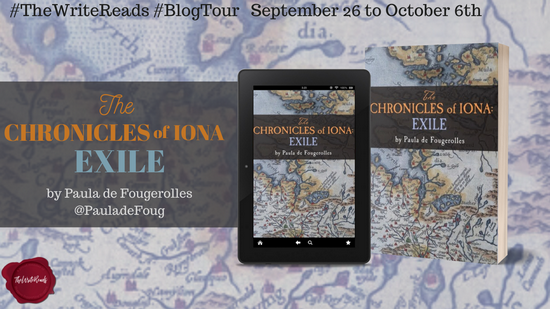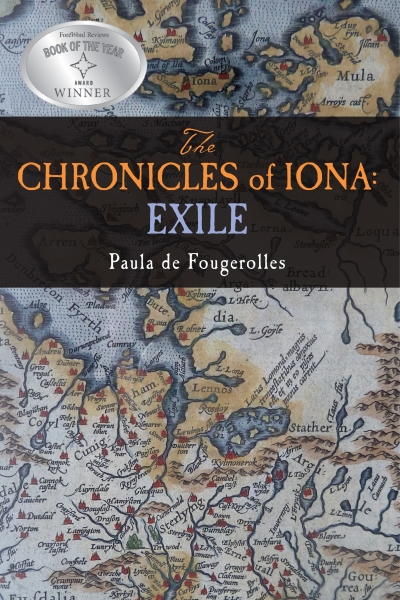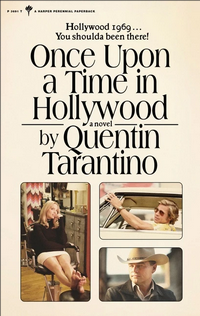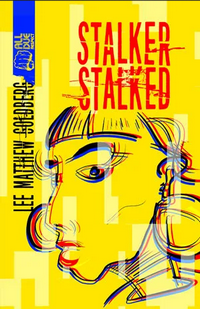When I scheduled the A Few Quick Questions with…Scott Spires post and said, I’d get this post up “in a little bit”, I didn’t realize that a transformer was about to blow a couple of blocks away from me, making it pretty difficult to finish/proofread/schedule this post. At least it was the same day. 

What’s Abandon All Hope About?
Set in the 1990s, this novel follows Evan—a cynical writer for an educational software company, Eldritch EduWare (a name that must’ve been the cause of problems for the marketing team—while being fairly apt). He actually commutes to the suburbs to work there, which is a nice twist. Evan doesn’t have a lot of drive or ambition, but he seems to like his life—maybe he could be happier, but he’s comfortable.
One day he encounters Eric, a college dropout. Convinced of his own insight, Eric eschews fiction, music, and the history of philosophy—he doesn’t want anyone else’s ideas. His are pure, new, and will enrich the lives of any who read his book—as soon as he finishes it. To pay the bills, Eric works a succession of temporary jobs, each disastrous in their own way.
Evan is intrigued by Eric, and makes an effort to check in on him from time to time (even trying to hire him for Eldritch at one point), but their storylines are fairly divergent. But common elements are there—we see them socialize (a little bit), muse on art and life, interact with family, colleagues, and supervisors, and so on.
He’s Making a List…
A technique that Spires falls back on often while describing things is the list. For example:
The basic building unit of the bad suburbs was the box. Boxes of various sizes and colors, of concrete, glass, steel and brick, big and small boxes arranged upright and sideways, black, white, gray, brown and transparent boxes, boxes stuck together like Legos or separated by swathes of asphalt, boxes with yards of grass or yards of concrete, could be seen everywhere as you looked out the train window.
Strip malls, mini-malls, and shopping centers alternated with identikit housing developments that bore fanciful names, like Avalon Estates, Balmoral-on-the-Lake, Provence-in-the-Woods, and Renaissance Acres: names that inadvertently highlighted their aesthetic failings.
That’s a lot of dense text that doesn’t say a whole lot—it’s frequently an effective technique. But I think Spires could’ve used a few less and been better for it—a list transitioning to a list transitioning to a list gets a bit mind-numbing. I largely enjoyed the writing, but this was a drawback.
A Scrambled Don Quixote
I typically make a point of not reading anything an author says in our Q&A before I write my post about their book. I’m not sure why I did this time, but if I hadn’t, I wouldn’t have seen his remark about this being a
Don Quixote in reverse – that is, with the somewhat cynical Sancho Panza character being the lead, and the idealistic Don Quixote figure being the secondary protagonist.
There’s part of me that kicked myself for not picking up on that—Spires wasn’t being subtle. At one point, Eric actually equates Evan to Quixote (I was too busy rolling my eyes at the conversation the two characters were having to pick up on it).
Now that I’ve chewed on it a bit now, I can see it to a degree. It’s not one of those insights that opens a fount of meaning to the text—nor is not having it a barrier to understanding the novel*. But it adds some dimension and depth to your understanding.
* He says with only a slightly defensive tone.
So, what did I think about Abandon All Hope?
In the mid-90s, there was a trend of indie movies in the Richard Linklater vein featuring characters who would unburden themselves to each other of their respective philosophical/aesthetic/political takes. This felt a whole lot like those to me. That’s not an evaluation, it’s just an observation.
This novel featured a large cast of unsympathetic and unlikeable characters acting in pretty unsympathetic and unlikeable ways, I’m not sure that there was any growth or development in the primary characters—their circumstances changed, but I think they remained the same (although there are signs that Eric and Evan might be on the verge of growth at the end). But that pretty much describes everyone I know. It might not be what we expect (want?) out of fictional characters, but it’s a pretty solid description of humanity.
This is one of those cases where I think the whole is less than the sum of its parts. A lot of the moments in this book were great–amusing, insightful, interesting—and the same goes for most of the characters. But Spires didn’t combine these moments and characters into a successful overall narrative.
I think overall he might have tried to accomplish too much. If say, Spires cut Evan out entirely (or significantly—just give us his interactions with Eric), in order to spend more time at Eric’s work (maybe requiring more characters there), and I can see my enjoyment of this increasing. Then write another novel about Evan trying to make his way in the world while writing his treatise, I should add. The strength of this book lies in the depictions of these two characters and their career/employment/lack thereof, as the US seems to be in a cultural shift regarding these things at the moment, it’s particularly thought-provoking and relevant on these matters.
Your results may vary, of course. I can think of a couple of people who’d likely disagree (possibly pretty strongly) with me if they picked up the book. I do recommend it for an intriguing experience, and hopefully, in your case something more.
Disclaimer: I received a copy of this novel from the author in exchange for this post and my honest opinion. I thank him for it.

This post contains an affiliate link. If you purchase from it, I will get a small commission at no additional cost to you. As always, opinions are my own.

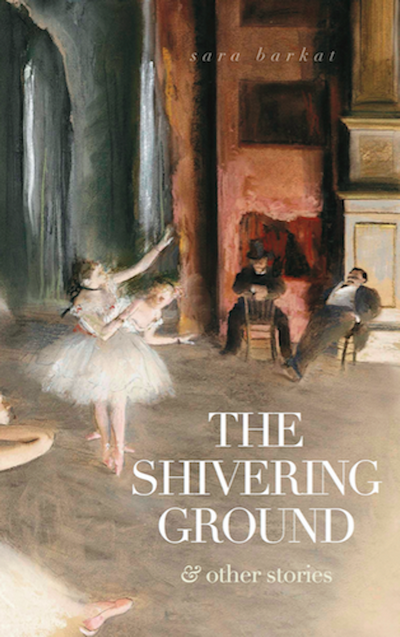

 Sara Barkat is an intaglio artist and writer with an educational background in philosophy and psychology, whose work has appeared in Every Day Poems, Tweetspeak Poetry, and Poetic Earth Month—as well as in the book How to Write a Poem: Based on the Billy Collins Poem “Introduction to Poetry.” Sara has served as an editor on a number of titles including the popular The Teacher Diaries: Romeo & Juliet, and is the illustrator of The Yellow Wall-Paper Graphic Novel, an adaptation of the classic story by Charlotte Perkins Gilman.
Sara Barkat is an intaglio artist and writer with an educational background in philosophy and psychology, whose work has appeared in Every Day Poems, Tweetspeak Poetry, and Poetic Earth Month—as well as in the book How to Write a Poem: Based on the Billy Collins Poem “Introduction to Poetry.” Sara has served as an editor on a number of titles including the popular The Teacher Diaries: Romeo & Juliet, and is the illustrator of The Yellow Wall-Paper Graphic Novel, an adaptation of the classic story by Charlotte Perkins Gilman.
![]()



 Grab a book, any book.
Grab a book, any book.